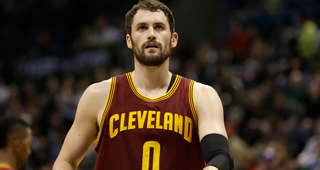Two weeks before the NBA playoffs are set to start, after two separate, quarter-baked in-season plans to help him find the form he displayed with the Minnesota Timberwolves have been drafted, put into action, and scrapped, Kevin Love looks slightly less comfortable in the Cleveland Cavaliers’ offense than Channing Frye does.
Last November, I wrote about the (somewhat) promising beginnings of Get Kevin Love Involved 1.0, a scheme that blew up in the hangar. The idea was a fine one, but its implementation was tepid and once Kyrie Irving recovered from a fractured kneecap and began to play starter’s minutes in January, Love faded into neglected third banana-dom. Across the board, Love’s numbers are either down or about what they were last season, when he was square peg-like alongside Irving and LeBron James, who didn’t seem particularly concerned with getting him the ball when he wasn’t wide open behind the three-point line. In late March of what’s supposed to be a title-contending year, about the only thing Love does exceptionally is throw outlet passes.
Love’s sudden, only sort of explicable decline—more than LeBron’s moodiness and busted jumper, and Irving’s erratic rehab season, and David Blatt disappearing in a puff of smarm-smoke, and Timofey Mozgov’s cratering confidence, and Tyronn Lue bungling rotations, and the bench lacking a single player who can create offense, and all the minor yet byzantine dysfunctions that leak out of the locker room and consume Basketball Twitter for an afternoon—is indicative of why the Cavs are likely to trudge through the East before getting outclassed in an NBA Finals against the Warriors or Spurs that will resemble those circa-2000 Lakers vs. Generic Sacrificial Eastern Conference Lamb championships where Shaq and Kobe, fresh off a bona fide rumble against the Blazers or Kings, donned functional sweats, threw on some Weather Report, and ecstatically yawned their way to a title.
The occasional predictability of the NBA postseason, where in certain years you can see the probable winner from months away, is at least balanced out by a sense of justice: rarely does a team survive four playoff series without realizing something like its full potential. Last season’s Warriors figured out that Draymond Green was not only a starter, but an offensive fulcrum who could defend just about anyone. LeBron’s Miami squads needed to lean on the versatility of his talents, which the superteam Heat didn’t realize until their second year together. The various championship incarnations of Tim Duncan’s Spurs have relied on role players ably spackling over whatever gaps Gregg Popovich instructs them to fill. The Showtime Lakers and Bird Era Celtics were concertos. Jordan’s Bulls were ordered by his gravity. Nearly all title-winners have a pleasing well-wroughtness, the air of a problem that’s been solved.
The Cavs are unsolvable, as currently constituted. The LeBron-Kyrie ball dominance wars are overblown, but Kevin Love is a lost cause. He and LeBron like to occupy the same spaces on the court, and LeBron was always going to win that argument, so Love spends most of his time milling around the arc, attempting to post up in a midrange no man’s land, or setting ball screens for which he’s not often rewarded. For reasons of coaching obtuseness, Love doesn’t captain Cleveland’s second units and as a result is almost never the offense’s focal point. And he doesn’t move with the same certitude and ease he displayed when he was a glass-eating, elbow-dominating powerhouse with the Wolves. Even the hook shots that go in and the nifty post-pump fake jumpers that find nylon look labored. Since becoming a Cavalier, Love has deflected questions about his health, but he seems to have chronic back problems that have left him a little bit stiffer, slower, and weaker than he was a couple of seasons ago.
The conversation about the Cavs since January of 2015 has, in between subtweet parsings, been dominated by proposals on how to make Kevin Love great again. The thing many of these proposals have in common is the tone of an exasperated lament. This shouldn’t be so damn difficult to figure out, Cleveland. But apparently it is, whether that’s due to Blatt and Lue’s incompetence, LeBron’s stubbornness, Irving’s score-first point guarding, or the task’s genuine, deceptive impossibility. Love can play better than he has over the past few months—he’s scuffling through a shooting slump that might end before the year is up—but he can’t be anything more than an overqualified, marginalized stretch big who gets a few token isolation touches per game. It’s just not going to happen for him.
This more or less dooms Cleveland, especially considering they’re set to go up against a world-historic Warriors juggernaut or, if luck smiles on them, a Spurs team that is merely 62-and-12. LeBron gives them a puncher’s chance at a championship, but he hasn’t been this much of an underdog since the days he was glowering at Sasha Pavlović. Perhaps this illustrates the issue as clearly as anything else: LeBron treats Kevin Love like he files the shaggy power forward in the same folder as every other disappointing teammate he’s ever had. We won’t be able to unravel the mystery of whose fault Cleveland’s underachievement is until next season, when Love is somewhere else, and Cavs are trying to solve a new problem, one they might actually be able to crack. Until then, they’ll play out the rest of the year as the best miserably incomplete team in basketball, which should be just bad enough to convince them they’re in need of drastic change.



